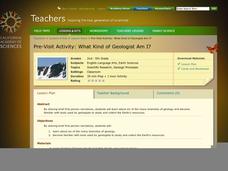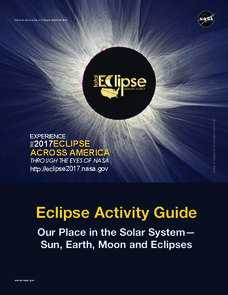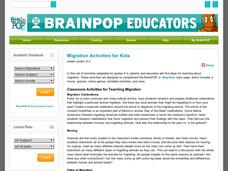Curated OER
Earth Day Snack Cup Project
Students plant a seed in a decorated left over yogurt cup. In this planting lesson plan, students reuse a yogurt cup that they would have thrown away, decorate it with wrapping paper, put dirt in it, and plant a seed.
Curated OER
Earth Day Clean-up
Students pick up trash in their neighborhood. In this Earth appreciation activity, students join together to pick up trash and make their neighborhood a more beautiful place.
California Academy of Science
What Kind of Geologist Am I?
Transform your class into young geologists as they learn about six different branches of geology. Using the included geology career descriptions and picture cards, learners work in small groups deciding which tools and locations fit...
NASA
Eclipse Activity Guide
Ever made solar s'mores? Or recreated the solar system using peanuts? Astronomers young and old investigate all things solar using a variety of activities. Explore how the sun works, types of light it emits, and methods of charting the...
Museum of Science
Worm Farm
It is not a barrel of monkeys—it's a jar of worms! Scholars create a worm farm in a spaghetti sauce jar. Pupils layer moist soil, sand, and oatmeal to create a habitat for worms. Individuals place worms into the habitat, cover it with...
BrainPOP
Migration Activities for Kids
For as long as there has been life on earth, animals, including humans, have used migration as a means of survival. This collection of activities supports young scientists as they learn about this behavioral adaptation, encouraging them...
California Academy of Science
Tropical Belt
Where in the world is the equator? Explore a world map with your class, coloring in oceans, continents, and rainforests while locating the three major lines of latitude: the equator, Tropic of Cancer, and Tropic of Capricorn. Discuss how...
Lunar and Planetary Institute
Oreo Moon Phases
Learning about the moon has never tasted delicious! Using the popular Oreo cookie as a model, young scientists carve out the cream filling to represent the different phases of the moon.
University of Florida
Protecting Our Water Resources
Teach young environmentalists to protect their planet's resources with a set of interactive experiments. Kindergartners and other youngsters learn about watersheds and the water cycle, while older elementary learners focus on fertilizer...
SciShow Kids
Let's Make the Solar System
Get crafty with the help of pictures and a real-time demonstration from a video that details the step-by-step process in creating a paper solar system.
John's ESL Community
Conserve Activity
Conserving energy is an important part of helping the environment. After coloring a picture of a hand turning off a light switch, kids copy the word onto a handwriting line.
Utah LessonPlans
Water, Please!
Pupils use a globe and cups of water to illustrated the amount of water versus land on earth and the amount of fresh versus salt water available to plants and animals.
University of Wisconsin
Identifying Your Soil for Rain Gardens
Teach your class the descriptive characteristics of soil. Provide information about particle size and a flow chart for assessing texture. Soil scientists then analyze samples and hypothesize which would be the best type for a rain...
Education Outside
Rain Dance
The importance of rainfall to the life cycle is underscored by an activity that engages class members in a discussion of how water effects newly planted seeds and supports their growth. Class members then create a dance to celebrate the...
University of Wisconsin
Conjunction Function
As part of a unit, this lesson familiarizes youngsters with components of a rain garden. They speculate about the role of an assigned component in contributing to a rain garden, and ultimately, in the health of the local watershed. Each...
University of Wisconsin
Bimodel Botany Bouquet
Gardeners are given an individual plant specimen from a bouquet of local rain garden plants. They group up by their plant type and then make observations together, name the plant, and introduce it to the rest of the class. You then share...
US Department of Agriculture
Sink or Float?
Will it sink or will it float? Learners predict the outcome as they drop random objects into a container of water. Then, they keep track of the results and record the data in a t-chart to draw a final conclusion.
University of Wisconsin
Planting a School Rain Garden
Finally, the day has arrived for introducing plants into the rain garden. If you have been following the entire unit, this will serve as a helpful guide for planting day. If you have not been using the previous lessons in this unit with...
Mary Pope Osborne, Classroom Adventures Program
Mummies in the Morning Egyptian pyramids, hieroglyphics
Visit the Magic Treehouse and take your class on a trip through time with a reading of the children's book Mummies in the Morning. Using the story to spark an investigation into Egyptian culture, this literature unit engages...
DiscoverE
An Egg-Citing Ride
Wheeeee! Young thrill seekers build a bungee jump—not for themselves, though, but for an egg. The egg must fall from a height of five feet and rebound within two inches of the ground or floor.
Curated OER
Planet Facts
Students click on the links to planets to learn facts about them. In this planets lesson plan, students read about 8 of the planets in the Solar System.
Other popular searches
- Earth Science Moon Phases
- Branches of Earth Science
- Earth Science Minerals
- Earth Science Inquiry
- Earth Science Lesson
- Earth Science Lesson Plans
- Basic Earth Science
- And Earth Science
- Earth Science Map Reading
- Earth Science and Art
- Earth Science Vocabulary
- Science Earth Layers






















